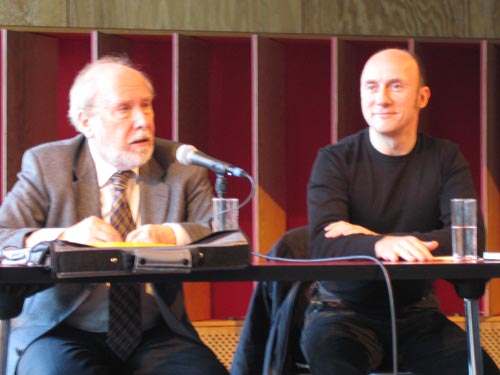Meeting a "hero" of my youth: Prof. Niklaus Wirth
Today was a surprising and very happy day for me: Scheduled to talk at the iX Conference - Better Software - in Colone, Germany, I was invited to participate in the panel discussion on "Software development - art or engineering dicipline" for Tom DeMarco, who had to leave the conference early. The topic was fun, although in the end we were mostly discussing whether there still was a software crisis or not and what its characteristics might be.
Most enjoyable for me, though, was to have the honor to sit next to a "hero" of my youth: Prof. Niklaus Wirth, most well known for his invention of the Pascal Language. I still remember reading his "Pascal Language Reference" (way back in 1980 or so), "Algorithms and Data Structures" and one of my all time favorite technical books: "Compiler Construction" - small, pragmatic, enlightening.

At the panel discussion with my "hero" from 25 years ago: Niklaus Wirth (left).
I found Prof. Wirth to be a very amiable man with a clear opinion on current trends in software development. Later, after the discussion, I did an interview with him and we found out, we share quite some views on the state of the industry, e.g. how necessary changes in teaching software engineering are to overcome current problems in programmer recruitement or software development.
But all in all the conference was an exciting event not only because of meeting Niklaus Wirth, but also because the presentation of my Software Cells architectural model was very well received and sparked several interesting discussions. I guess I really need to sit down and write a book on it to sum up all the aspects...
And at the end we listened to a closing keynote from Peter Krieg - author of "Die paranoide Maschine - Computer zwischen Wahn und Sinn" - who talked about a new way of organizing data. Instead of storing data as we know it, he suggests we should move to storing relations between "data atoms" and regenerate the original data when needed. He likened this to how pictures are handled in computer games: games like Doom don´t come with a database of pictures/bitmaps but rather generate the images in realtime. During the keynote Peter Krieg´s concepts were not all too tangible, though. Just impressions of holographic images and associative memories flashed by my mind´s eye. However, after the keynote Peter Krieg showed me a first proof of concept on his laptop. It´s based on an open source project (http://www.pileworks.org/) and showed full text search in a large text corpus. Very impressing speed and functionality - especially when you remind yourself, there is no such thing as a fulltext index of words in its database. Nevertheless I need to think about his "relationistic approach" to data storage for a while. Good food for thought!